Unit 7Teenagers shoud be allowed to choose their own clothes Section A (1a~2d) 课件 (共31张PPT,内嵌音频)2023
文档属性
| 名称 | Unit 7Teenagers shoud be allowed to choose their own clothes Section A (1a~2d) 课件 (共31张PPT,内嵌音频)2023 | 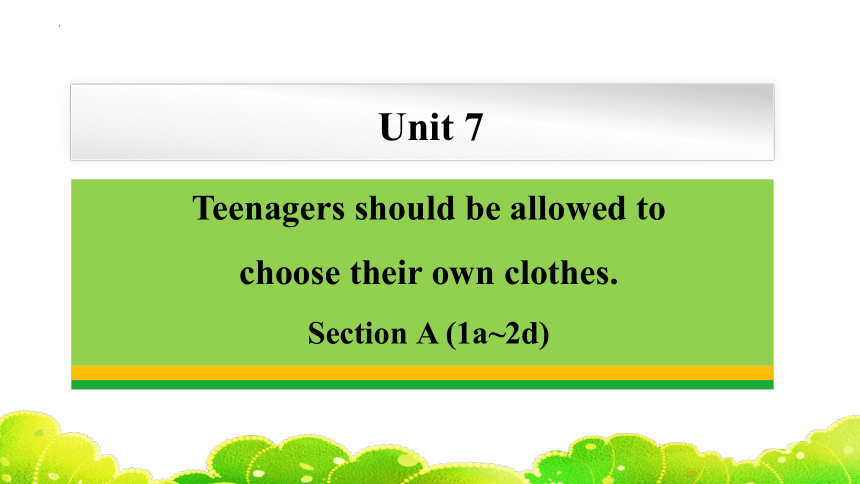 | |
| 格式 | pptx | ||
| 文件大小 | 13.9MB | ||
| 资源类型 | 教案 | ||
| 版本资源 | 人教新目标(Go for it)版 | ||
| 科目 | 英语 | ||
| 更新时间 | 2023-12-23 13:44:33 | ||
图片预览

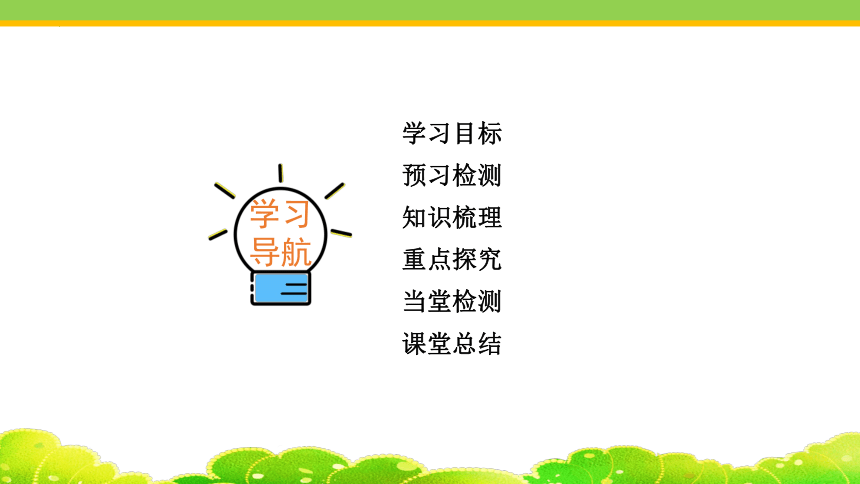
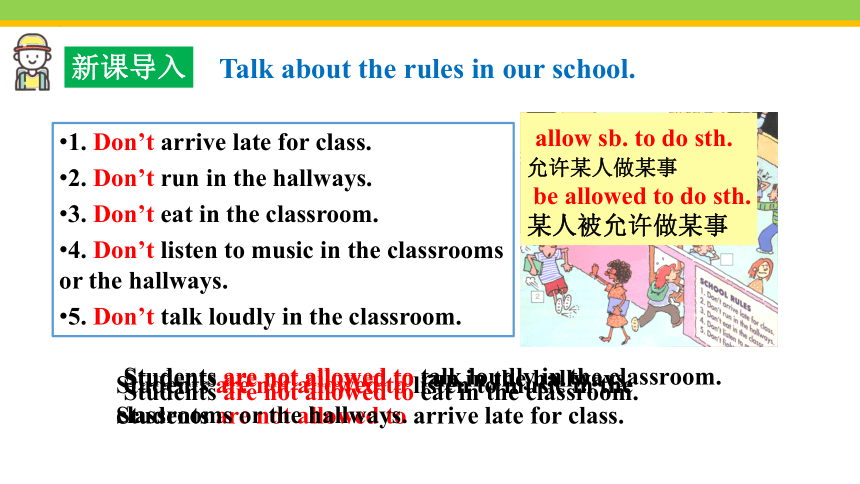
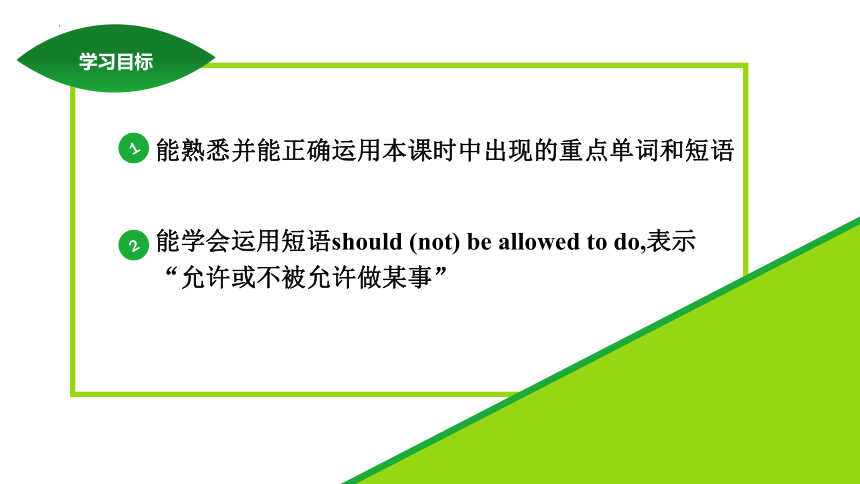
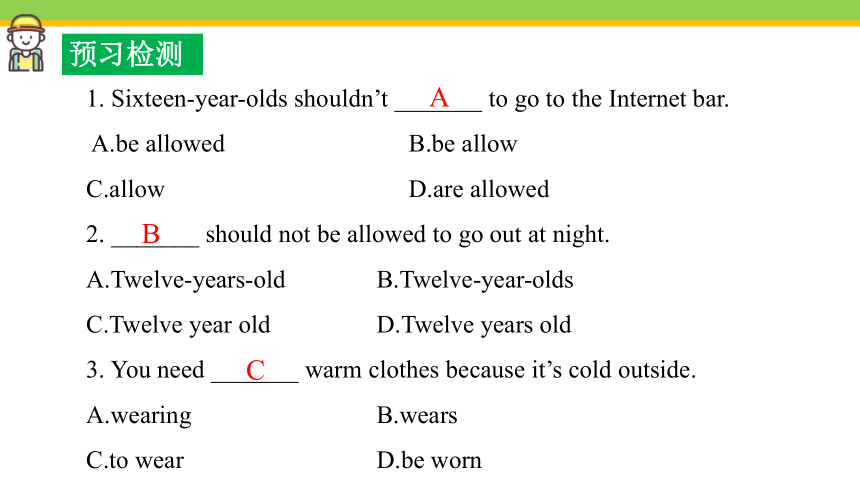
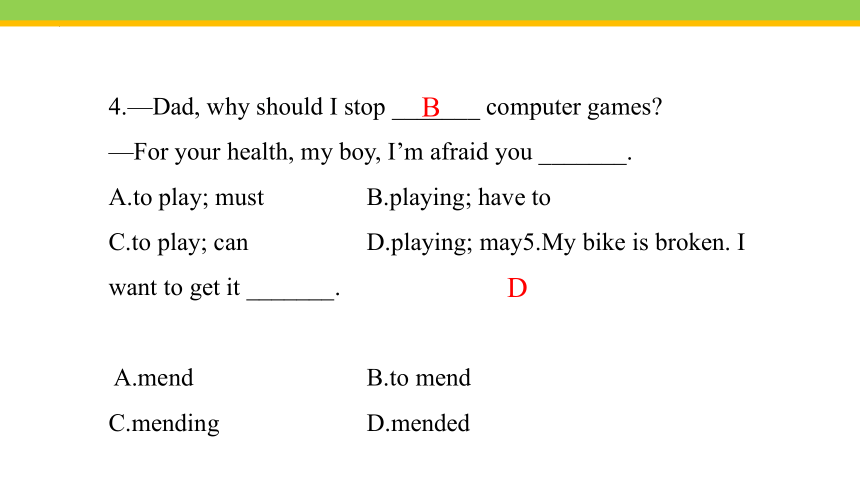
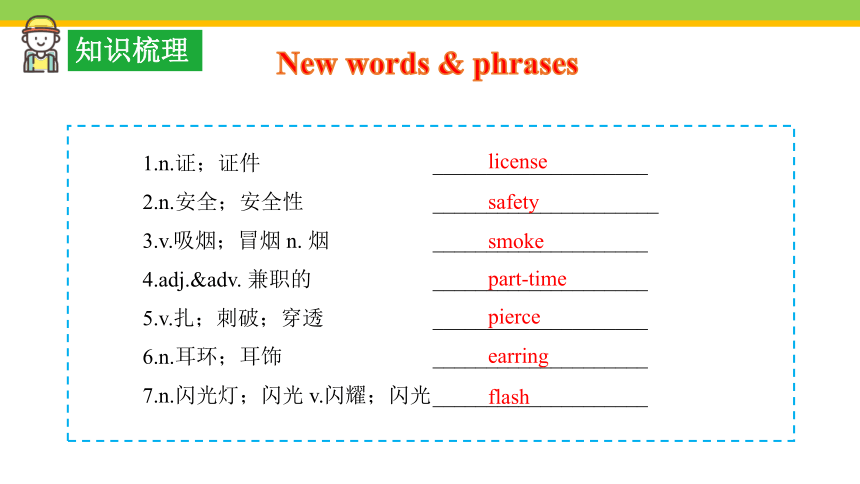
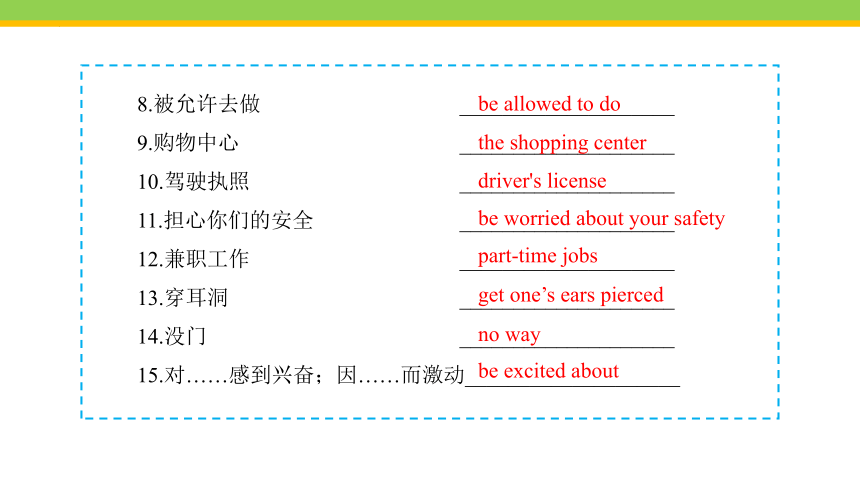
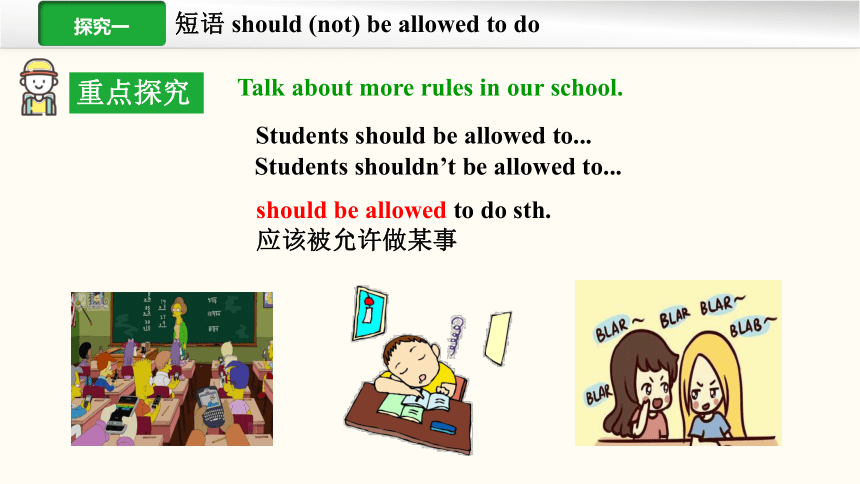

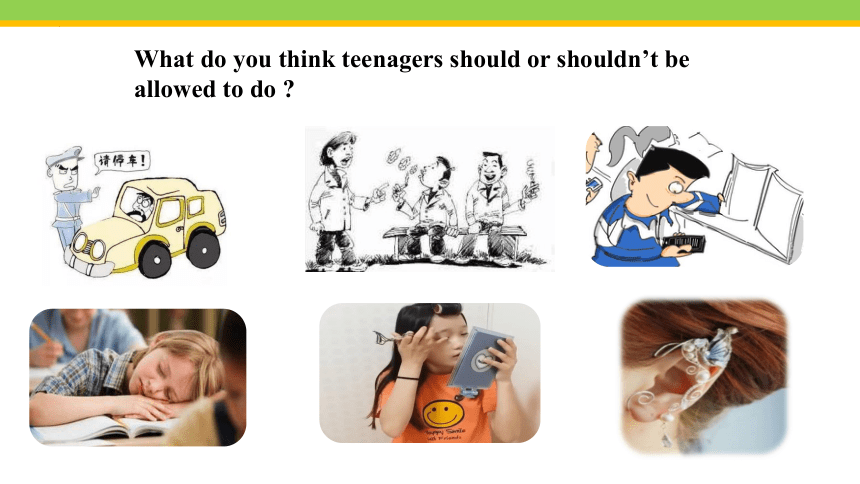
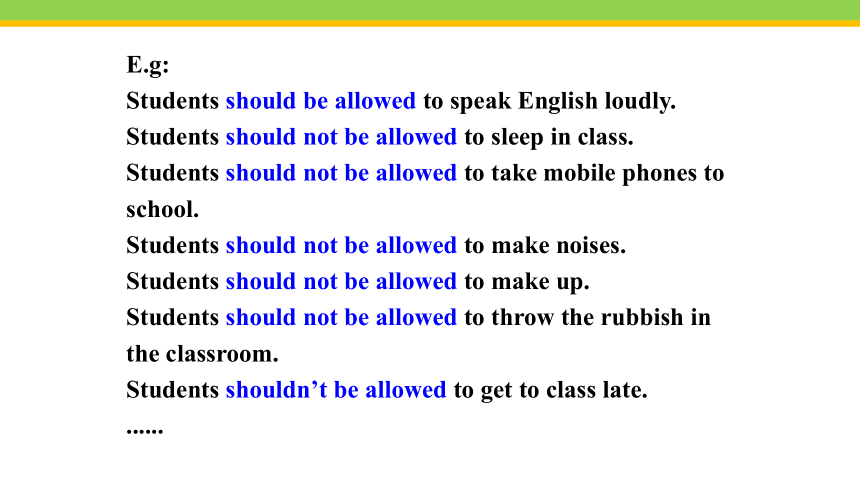
文档简介
(共31张PPT)
Unit 7
Teenagers should be allowed to choose their own clothes.
Section A (1a~2d)
学习目标
预习检测
知识梳理
课堂总结
学习
导航
重点探究
当堂检测
新课导入
Talk about the rules in our school.
1. Don’t arrive late for class.
2. Don’t run in the hallways.
3. Don’t eat in the classroom.
4. Don’t listen to music in the classrooms or the hallways.
5. Don’t talk loudly in the classroom.
Students are not allowed to arrive late for class.
Students are not allowed to run in the hallways.
Students are not allowed to eat in the classroom.
Students are not allowed to listen to music in the classrooms or the hallways.
Students are not allowed to talk loudly in the classroom.
allow sb. to do sth.
允许某人做某事
be allowed to do sth.
某人被允许做某事
2
能学会运用短语should (not) be allowed to do,表示“允许或不被允许做某事”
1
能熟悉并能正确运用本课时中出现的重点单词和短语
预习检测
1. Sixteen-year-olds shouldn’t _______ to go to the Internet bar.
A.be allowed B.be allow
C.allow D.are allowed
2. _______ should not be allowed to go out at night.
A.Twelve-years-old B.Twelve-year-olds
C.Twelve year old D.Twelve years old
3. You need _______ warm clothes because it’s cold outside.
A.wearing B.wears
C.to wear D.be worn
A
C
B
4.—Dad, why should I stop _______ computer games
—For your health, my boy, I’m afraid you _______.
A.to play; must B.playing; have to
C.to play; can D.playing; may5.My bike is broken. I want to get it _______.
A.mend B.to mend
C.mending D.mended
B
D
知识梳理
New words & phrases
1.n.证;证件 ____________________
2.n.安全;安全性 _____________________
3.v.吸烟;冒烟 n. 烟 ____________________
4.adj.&adv. 兼职的 ____________________
5.v.扎;刺破;穿透 ____________________
6.n.耳环;耳饰 ____________________
7.n.闪光灯;闪光 v.闪耀;闪光 ____________________
license
safety
part-time
smoke
pierce
earring
flash
8.被允许去做 ____________________
9.购物中心 ____________________
10.驾驶执照 ____________________
11.担心你们的安全 ____________________
12.兼职工作 ____________________
13.穿耳洞 ____________________
14.没门 ____________________
15.对……感到兴奋;因……而激动____________________
be allowed to do
the shopping center
driver's license
be worried about your safety
part-time jobs
get one’s ears pierced
no way
be excited about
重点探究
短语 should (not) be allowed to do
Talk about more rules in our school.
Students should be allowed to...
Students shouldn’t be allowed to...
should be allowed to do sth.
应该被允许做某事
allow 及物动词,意为“允许;准许”,常用于下列结构中:
① allow sb. to do sth. 允许某人做某事
例:The teacher allowed him to go into the classroom.
老师允许他进教室。
② allow doing sth.允许做某事
例:We don’t allow smoking in public places.
我们不允许在公共场所吸烟。
③ be (not) allowed to do sth. (不) 被允许做某事
例:Passengers are not allowed to smoke.
乘客不允许吸烟。
What do you think teenagers should or shouldn’t be allowed to do
E.g:
Students should be allowed to speak English loudly.
Students should not be allowed to sleep in class.
Students should not be allowed to take mobile phones to school.
Students should not be allowed to make noises.
Students should not be allowed to make up.
Students should not be allowed to throw the rubbish in the classroom.
Students shouldn’t be allowed to get to class late.
......
1a. Read the statements below. Circle A for agree or D for disagree.
1. Teenagers should not be allowed to smoke.
2. Sixteen-year-olds should be allowed to drive.
3. Students should not be allowed to have part-time jobs.
4. Sixteen-year-olds should be allowed to get their ears pierced.
5. Teenagers should be allowed to choose their own clothes.
A D
A D
A D
A D
A D
Sixteen-year-olds should be allowed to drive.
sixteen-year-olds在此句中用作名词,意为“16岁的青少年”。“基数词-量词(单数)-形容词”构成的词通常作形容词,作前置定语,而且这一整体是一个词,后加s表示一类人或事物。
如:Fifty-year-olds should retire.
五十岁的人应该退休。
sixteen-year-old“16岁的”,是由“基数词-名词(单数)-形容词”构成的复合形容词,在句中通常做前置定语,修饰名词。
例:My pen pal is a sixteen-year-old boy.
我的笔友是一个16岁的男孩。
sixteen years old“16岁”,用来描述人的年龄,常在句中作表语。
例:My brother is sixteen years old.
我哥哥十六岁了。
Discussion
Talk about these pictures with your partner.
Teenagers should /should not be allowed to…
I agree/disagree.
Pre-listening
He just got his driver’s license.
They are choosing their own clothes.
She got her ears pierced.
Talk about the pictures.
1b. Listen and circle T for true or F for false.
1. Anna can go to the shopping center by bus. T F
2. Anna wants to get her ears pierced. T F
3. Anna wants to choose her own clothes. T F
watch Gaby getting her
ears pierced.
Anna
Anna's mother
Can I go to the shopping center with John
He just got his driver's license.
No way! I don’t think sixteen-year-olds should be allowed to drive. I'm worried about your safty.
No way! 不行!这是英语口语中一个直接拒绝对方的表达用语,强调不赞同别人的观点,或根本没有可能按要求去做某事,具体意思类似于汉语的“不可能;不行”等。
Pair work
1c. Look at the statements in 1a and make conversations.
I don’t think sixteen-year-olds
should be allowed to ...
I agree/disagree. They …
A: I don’t think sixteen-year-olds
should be allowed to drive.
B: I agree. They aren’t serious enough.
Larry
Kathy
Molly
What is the boy in the picture doing
What are the two girls talking about
Larry is Molly’s brother.
Kathy and Molly are taking about Larry.
2a. What does Molly think of Kathy’s statements Listen and circle A for Agree. D for Disagree or DK for Doesn’t Know.
Kathy Molly
1. Sixteen-year-olds should not be allowed to work at night.. A D DK
2. Larry shouldn’t work every night. A D DK
3. He should cut his hair. A D DK
4. He should stop wearing that silly earring. A D DK
5. He doesn’t seem to have many friends. A D DK
耳环
2b. Listen again. What are Kathy’s and Molly’s reasons Number their reasons in the correct order.
_____ It looks cool.
_____ Young people need to sleep.
_____ He needs to spend time with
friends.
_____ He needs time to do homework.
_____ It doesn't look clean.
1
2
3
4
5
2c. Make a list of things teenagers should and should not be allowed to do. Discuss your list with your partner.
Do you think teenagers should ...
Yes, I ... / No, I ...
What teenagers should be allowed to do What teenagers should not be allowed to do
....... .......
wear the school uniform keep quiet in the library eat outside of the classroom practice what you have learned make your bed after getting up ...... arrive late for class
run in the hallway
eat anything in the class
watch TV late every night
leave dirty clothing everywhere
in the house
......
should
should not
2d. Role-play the conversation.
Sandy: I’m really excited about seeing the famous paintings by Picasso.
Wu Lan: Me, too! I’m glad Mr. Smith chose the art museum for our school
trip this year.
Sandy: I'm going to bring my new camera to take lots of photos!
Wu Lan: Oh, no. Mr. Smith says we must not take photos. It's not allowed
in the museum.
Sandy: That's too bad! Do you think we may be allowed to take
photos if we don't use a flash
Wu Lan: Hmm… I think they just want to protect the paintings. So if
you don't use a flash, then it may be OK.
Sandy: Yeah. I think we should be allowed to do that. I'll bring my
camera anyway.
活动小结
通过以上活动,我们知道表示“允许或不被允许做某事”用:
_______________________________________
表示同意用:
_______________________________________
表示不同意用:
_______________________________________
当堂检测见DCF课件
should (not) be allowed to do sth.
I agree./Well, OK.
I disagree (with you)./I don’t think so./No way!
根据汉语提示完成下列句子。
当堂检测
1.如果不使用闪光灯,我们也许允许拍照。
We may _______ _______ _______ _______ _______ if we don’t use a flash.
2.我父母允许我晚上看电视。
My parents_______ _______ _______ _______ TV at night.
3.应该允许安娜自己选择衣服。
Anna _______ _______ _______ _______ _______ her own clothes.
be allowed to take photos
allow me to watch
should be allowed to choose
4.课堂上禁止学生们听音乐。
Students _______ _______ _______ _______ listen to music in class.
5.这张照片可能是他2019年拍的。
The photo _______ _______ _______ in 2019 by him.
mustn’t be allowed to
may be taken
课堂总结
Unit 7
Section A (1a~2d)
重点短语:
______________________________________________
______________________________________________
______________________________________________
______________________________________________
be allowed to do
the shopping center
driver's license
be worried about your safety
part-time jobs
get one's ears pierced
no way
be excited about
表示“允许或不被允许做某事”:
_______________________________
表示同意:
_______________________________
表示不同意:
_______________________________
_______________________________
should (not) be allowed to do sth.
I agree./Well, OK.
I disagree (with you)./I don’t think so./No way!
Unit 7
Teenagers should be allowed to choose their own clothes.
Section A (1a~2d)
学习目标
预习检测
知识梳理
课堂总结
学习
导航
重点探究
当堂检测
新课导入
Talk about the rules in our school.
1. Don’t arrive late for class.
2. Don’t run in the hallways.
3. Don’t eat in the classroom.
4. Don’t listen to music in the classrooms or the hallways.
5. Don’t talk loudly in the classroom.
Students are not allowed to arrive late for class.
Students are not allowed to run in the hallways.
Students are not allowed to eat in the classroom.
Students are not allowed to listen to music in the classrooms or the hallways.
Students are not allowed to talk loudly in the classroom.
allow sb. to do sth.
允许某人做某事
be allowed to do sth.
某人被允许做某事
2
能学会运用短语should (not) be allowed to do,表示“允许或不被允许做某事”
1
能熟悉并能正确运用本课时中出现的重点单词和短语
预习检测
1. Sixteen-year-olds shouldn’t _______ to go to the Internet bar.
A.be allowed B.be allow
C.allow D.are allowed
2. _______ should not be allowed to go out at night.
A.Twelve-years-old B.Twelve-year-olds
C.Twelve year old D.Twelve years old
3. You need _______ warm clothes because it’s cold outside.
A.wearing B.wears
C.to wear D.be worn
A
C
B
4.—Dad, why should I stop _______ computer games
—For your health, my boy, I’m afraid you _______.
A.to play; must B.playing; have to
C.to play; can D.playing; may5.My bike is broken. I want to get it _______.
A.mend B.to mend
C.mending D.mended
B
D
知识梳理
New words & phrases
1.n.证;证件 ____________________
2.n.安全;安全性 _____________________
3.v.吸烟;冒烟 n. 烟 ____________________
4.adj.&adv. 兼职的 ____________________
5.v.扎;刺破;穿透 ____________________
6.n.耳环;耳饰 ____________________
7.n.闪光灯;闪光 v.闪耀;闪光 ____________________
license
safety
part-time
smoke
pierce
earring
flash
8.被允许去做 ____________________
9.购物中心 ____________________
10.驾驶执照 ____________________
11.担心你们的安全 ____________________
12.兼职工作 ____________________
13.穿耳洞 ____________________
14.没门 ____________________
15.对……感到兴奋;因……而激动____________________
be allowed to do
the shopping center
driver's license
be worried about your safety
part-time jobs
get one’s ears pierced
no way
be excited about
重点探究
短语 should (not) be allowed to do
Talk about more rules in our school.
Students should be allowed to...
Students shouldn’t be allowed to...
should be allowed to do sth.
应该被允许做某事
allow 及物动词,意为“允许;准许”,常用于下列结构中:
① allow sb. to do sth. 允许某人做某事
例:The teacher allowed him to go into the classroom.
老师允许他进教室。
② allow doing sth.允许做某事
例:We don’t allow smoking in public places.
我们不允许在公共场所吸烟。
③ be (not) allowed to do sth. (不) 被允许做某事
例:Passengers are not allowed to smoke.
乘客不允许吸烟。
What do you think teenagers should or shouldn’t be allowed to do
E.g:
Students should be allowed to speak English loudly.
Students should not be allowed to sleep in class.
Students should not be allowed to take mobile phones to school.
Students should not be allowed to make noises.
Students should not be allowed to make up.
Students should not be allowed to throw the rubbish in the classroom.
Students shouldn’t be allowed to get to class late.
......
1a. Read the statements below. Circle A for agree or D for disagree.
1. Teenagers should not be allowed to smoke.
2. Sixteen-year-olds should be allowed to drive.
3. Students should not be allowed to have part-time jobs.
4. Sixteen-year-olds should be allowed to get their ears pierced.
5. Teenagers should be allowed to choose their own clothes.
A D
A D
A D
A D
A D
Sixteen-year-olds should be allowed to drive.
sixteen-year-olds在此句中用作名词,意为“16岁的青少年”。“基数词-量词(单数)-形容词”构成的词通常作形容词,作前置定语,而且这一整体是一个词,后加s表示一类人或事物。
如:Fifty-year-olds should retire.
五十岁的人应该退休。
sixteen-year-old“16岁的”,是由“基数词-名词(单数)-形容词”构成的复合形容词,在句中通常做前置定语,修饰名词。
例:My pen pal is a sixteen-year-old boy.
我的笔友是一个16岁的男孩。
sixteen years old“16岁”,用来描述人的年龄,常在句中作表语。
例:My brother is sixteen years old.
我哥哥十六岁了。
Discussion
Talk about these pictures with your partner.
Teenagers should /should not be allowed to…
I agree/disagree.
Pre-listening
He just got his driver’s license.
They are choosing their own clothes.
She got her ears pierced.
Talk about the pictures.
1b. Listen and circle T for true or F for false.
1. Anna can go to the shopping center by bus. T F
2. Anna wants to get her ears pierced. T F
3. Anna wants to choose her own clothes. T F
watch Gaby getting her
ears pierced.
Anna
Anna's mother
Can I go to the shopping center with John
He just got his driver's license.
No way! I don’t think sixteen-year-olds should be allowed to drive. I'm worried about your safty.
No way! 不行!这是英语口语中一个直接拒绝对方的表达用语,强调不赞同别人的观点,或根本没有可能按要求去做某事,具体意思类似于汉语的“不可能;不行”等。
Pair work
1c. Look at the statements in 1a and make conversations.
I don’t think sixteen-year-olds
should be allowed to ...
I agree/disagree. They …
A: I don’t think sixteen-year-olds
should be allowed to drive.
B: I agree. They aren’t serious enough.
Larry
Kathy
Molly
What is the boy in the picture doing
What are the two girls talking about
Larry is Molly’s brother.
Kathy and Molly are taking about Larry.
2a. What does Molly think of Kathy’s statements Listen and circle A for Agree. D for Disagree or DK for Doesn’t Know.
Kathy Molly
1. Sixteen-year-olds should not be allowed to work at night.. A D DK
2. Larry shouldn’t work every night. A D DK
3. He should cut his hair. A D DK
4. He should stop wearing that silly earring. A D DK
5. He doesn’t seem to have many friends. A D DK
耳环
2b. Listen again. What are Kathy’s and Molly’s reasons Number their reasons in the correct order.
_____ It looks cool.
_____ Young people need to sleep.
_____ He needs to spend time with
friends.
_____ He needs time to do homework.
_____ It doesn't look clean.
1
2
3
4
5
2c. Make a list of things teenagers should and should not be allowed to do. Discuss your list with your partner.
Do you think teenagers should ...
Yes, I ... / No, I ...
What teenagers should be allowed to do What teenagers should not be allowed to do
....... .......
wear the school uniform keep quiet in the library eat outside of the classroom practice what you have learned make your bed after getting up ...... arrive late for class
run in the hallway
eat anything in the class
watch TV late every night
leave dirty clothing everywhere
in the house
......
should
should not
2d. Role-play the conversation.
Sandy: I’m really excited about seeing the famous paintings by Picasso.
Wu Lan: Me, too! I’m glad Mr. Smith chose the art museum for our school
trip this year.
Sandy: I'm going to bring my new camera to take lots of photos!
Wu Lan: Oh, no. Mr. Smith says we must not take photos. It's not allowed
in the museum.
Sandy: That's too bad! Do you think we may be allowed to take
photos if we don't use a flash
Wu Lan: Hmm… I think they just want to protect the paintings. So if
you don't use a flash, then it may be OK.
Sandy: Yeah. I think we should be allowed to do that. I'll bring my
camera anyway.
活动小结
通过以上活动,我们知道表示“允许或不被允许做某事”用:
_______________________________________
表示同意用:
_______________________________________
表示不同意用:
_______________________________________
当堂检测见DCF课件
should (not) be allowed to do sth.
I agree./Well, OK.
I disagree (with you)./I don’t think so./No way!
根据汉语提示完成下列句子。
当堂检测
1.如果不使用闪光灯,我们也许允许拍照。
We may _______ _______ _______ _______ _______ if we don’t use a flash.
2.我父母允许我晚上看电视。
My parents_______ _______ _______ _______ TV at night.
3.应该允许安娜自己选择衣服。
Anna _______ _______ _______ _______ _______ her own clothes.
be allowed to take photos
allow me to watch
should be allowed to choose
4.课堂上禁止学生们听音乐。
Students _______ _______ _______ _______ listen to music in class.
5.这张照片可能是他2019年拍的。
The photo _______ _______ _______ in 2019 by him.
mustn’t be allowed to
may be taken
课堂总结
Unit 7
Section A (1a~2d)
重点短语:
______________________________________________
______________________________________________
______________________________________________
______________________________________________
be allowed to do
the shopping center
driver's license
be worried about your safety
part-time jobs
get one's ears pierced
no way
be excited about
表示“允许或不被允许做某事”:
_______________________________
表示同意:
_______________________________
表示不同意:
_______________________________
_______________________________
should (not) be allowed to do sth.
I agree./Well, OK.
I disagree (with you)./I don’t think so./No way!
同课章节目录
- Unit 1 How can we become good learners.
- Section A
- Section B
- Unit 2 I think that mooncakes are delicious!
- Section A
- Section B
- Unit 3 Could you please tell me where the restroom
- Section A
- Section B
- Unit 4 I used to be afraid of the dark.
- Section A
- Section B
- Unit 5 What are the shirts made of?
- Section A
- Section B
- Review of Units 1-5
- Unit 6 When was it invented?
- Section A
- Section B
- Unit 7 Teenagers should be allowed to choose their
- Section A
- Section B
- Unit 8 It must belong to Carla.
- Section A
- Section B
- Unit 9 I like music that I can dance to.
- Section A
- Section B
- Unit 10 You're supposed to shake hands.
- Section A
- Section B
- Review of Units 6-10
- Unit 11 Sad movies make me cry.
- Section A
- Section B
- Unit 12 Life is full of the unexpected
- Section A
- Section B
- Unit 13 We're trying to save the earth!
- Section A
- Section B
- Unit 14 I remember meeting all of you in Grade 7.
- Section A
- Section B
- Review of Units 11-14
